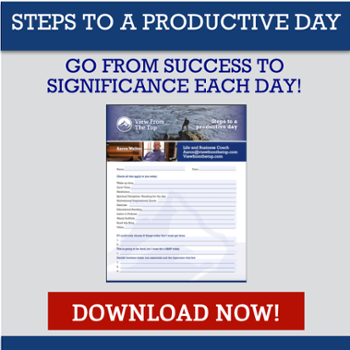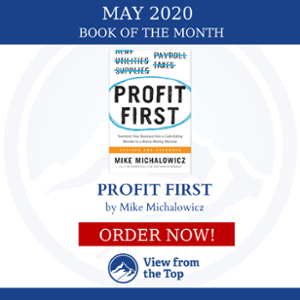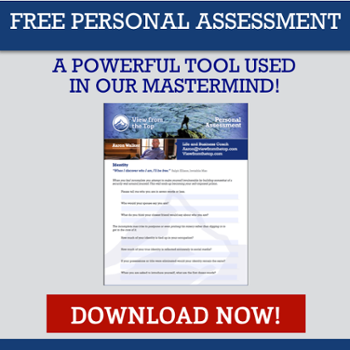.png?width=1080&name=This%20is%20the%20time%20to%20sow%20seed%20in%20places%20where%20those%20who%20benefit%20never%20see%20it%20coming.%20(1).png)
As a Christian life coach, I often see what the Book of Ecclesiastes would call “an evil under the sun.” Struggling entrepreneurs feel guilty and ashamed that their business isn’t producing like it should.
The personal result, especially among men, is feeling like “a 37-year old unemployed loser,” as Ben Affleck’s character says in the movie The Company Men. You might be older or younger than thirty-seven, but the rest can still apply.
One reason we chose “increasing revenue” as our focus this spring is personal and professional success go hand in hand. Though personal growth is more meaningful, we need to be honest and say most personal growth costs money. Coaches, courses, sacrifices and deeds of goodness to others usually imply a financial cost.
The Habits of a Mastermind Group
A young man who struggled to make his business earn an income applied to join Iron Sharpens Iron. When we got on the phone, he was very honest about lacking the income to pay, and said to me, “I shouldn’t have applied. I don’t know what I was thinking.”
I knew what he was thinking, though. I could hear the anxiety and desperation in his voice. He was floundering, gasping to figure out something - anything - that would make him valuable to the marketplace. We talked further, but agreed that being part of a mastermind group would not solve his most pressing problem: being broke.
We Can’t Teach What We Discourage
The men in our online mastermind groups usually have some familiarity with my friend Dave Ramsey, and all he’s done to help people master personal finance. We believe in living debt-free, cash-rich and radically generous at View From the Top. To turn around and tell our members to engage in financial irresponsibility, so as to make their business work, would be a huge act of hypocrisy.
Yet there’s no denying, business is a spiritual activity. It’s spiritual because we can’t guarantee, measure or predict its outcome or impact, just like marriage. Starting either one of these institutions is, by definition, a roll of the dice.
The best way to serve you, then, is to teach habits, mindset and environmental controls that maximize your opportunities of becoming successful. We want you to replicate and reap the benefits of learning the ancient path to personal and professional growth. We want you to live a life and leave a legacy to be remembered.
As Baroness Margaret Thatcher once said, “No one would remember the Good Samaritan if he only had good intentions; he had money as well.”
Rule #1 - Give Beyond Your Means
Over the next several months, the young man I’d spoken to demonstrated the pattern of behavior of our mastermind groups online. What he could not produce in money, he more than made up for in being a giver. People began to take notice of how he kept creating ideal opportunities for them, which they wouldn’t have known about otherwise.
This is the first great habit and mindset of those who join our tribe. Without asking anything in return, you give of your time, talent or treasure.
In this case, my friend (now a member of ISI) used his talent as a connector and his massive professional Rolodex (treasure) in lieu of actual revenue. It ended up inducingrevenue for him, because nature applauds a giver just like it abhors a vacuum. You can’t endlessly give without thought of return, and not end up with a return anyway.
Habits of generosity also have a profound, disarming effect on personal greed. If you wrestle with it, you are likelier to restrain that appetite because of the obvious clash. There’s no such thing as someone totally “immune” to greed, but there is immense power in habits and environment that run interference on it.
Rule #2 - Know Thyself
Ancient Stoic writers believed the only thing we truly control is how we react or respond to life around us. In our masterminds online, this usually kicks in with personal failures, upper-limit challenges and ungodly beliefs. But we can also get blindsided by our ignorance of how human beings work - why they rush to purchase some things and yawn at others.
If this is true, we’re overdue to ask why we respond to market demand for Product A by offering Product K. This is a common mistake among entrepreneurs - believing they have something to sell without bothering to find out if people are likely to buy.
I know our culture celebrates entrepreneurs who “invent” the market demand for a product or service, like Apple did with the iPod. I’d love to do that myself, but the numbers suggest that’s a far less common experience. Most entrepreneurs who succeed do so by figuring out what people already want or need, and then finding a profitable way to provide it to them.
Rule #3 - Plan. Write. Fail. Review. Adjust.
The third leg of this stool is something well-understood to people who officiate sporting events. You need to have a clear view of what happens before, during and after the play.
In other words, referees often call penalties based on a 360-degree overview of a play that takes place in seconds. This is a remarkable mental challenge, which gives me a new respect for the process. These men and women make their judgments over seven seconds of action based on everything they observe and calculate before, during and after that play occurred.
Business permits no less diligence on the part of the entrepreneur. You might need to hire outside eyes to do it, and it definitely can’t be done in seven seconds. But there’s no skipping pro forma budgeting, income and expense tracking, goal-setting, forecasting, business plans, after-action reviews and so forth.
This is what makes the presence of a mentor, coach or mastermind group so critical. How do you know if your projections are good? Who do you trust to question and analyze your numbers? What kind of goals are realistic? This is so much easier to do with a team or advisor, rather than by yourself.
Helping the Broke
One more word, for people who have passed this level: who have you recently helped, %20help%20others.%E2%80%9D%20(1).png?width=412&name=%E2%80%9CYou%20can%E2%80%99t%20help%20others%20if%20you%E2%80%99re%20broke%20%E2%80%A6%20and%20you%E2%80%99re%20broke%20if%20you%20can%E2%80%99t%20(or%20won%E2%80%99t)%20help%20others.%E2%80%9D%20(1).png) who is currently broke?
who is currently broke?
You see, as true as it is that you can’t help others if you’re broke … it’s also true that you’re broke if you can’t (or won’t) help others.
I’m reminded of Jesus’ words to the church at Laodicea: “You say, ‘I am rich; I have acquired wealth and do not need a thing.’ But you don’t realize you’re wretched, poor, pitiful, blind and naked.” Those are some strong words, but they’re directed at the smug sense of satisfaction we’re tempted to adopt when we do succeed.
This is not the time to do as I nearly did, when I retired for the third time and tried to go hide my head in the sand of a tropical beach.
This is the time to sow seed in places where those who benefit never see it coming.





